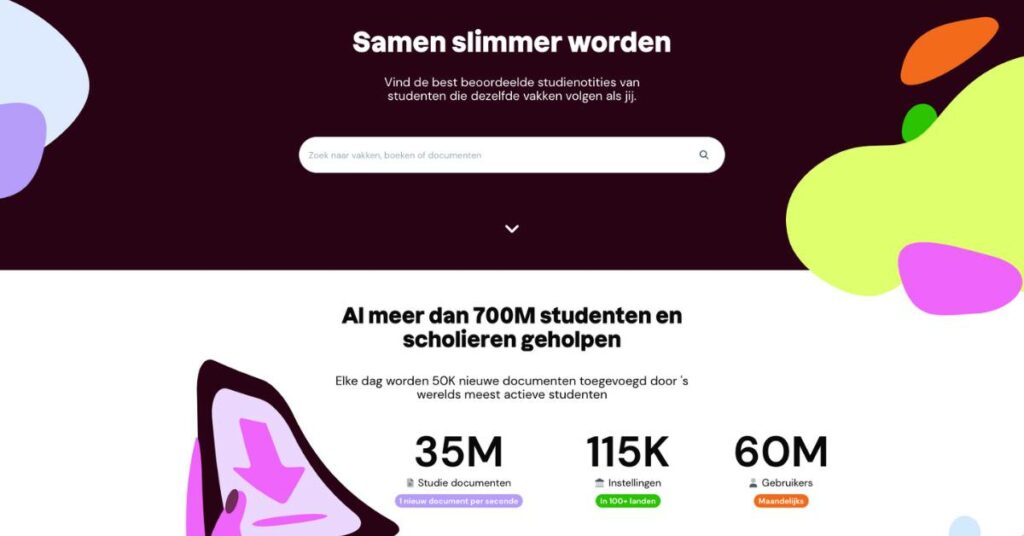If you are a student at Erasmus University Rotterdam (EUR) then your access to Studocu, a student-to-student knowledge-sharing platform used by over 50 million students worldwide, could soon be in jeopardy.
The EUR has filed a lawsuit against Studeersnel B.V., which also operates under the name Studocu outside of the Netherlands, for copyright infringement. The lawsuit is related to a dedicated website called Studeersnel.nl operated by Studeersnel B.V., on which the startup makes educational materials accessible to students, which is used by over 80 percent of the Dutch student population.
The university named after Desiderius Erasmus Roterodamus, a 15th-century humanist and theologian, alleges the website hosts syllabi, assignments, practice or past exams and other educational materials created by employees of EUR in which the university owns the copyright.
While Studocu dismisses the claim, the lawsuit could have serious implications not only for the students of Erasmus University Rotterdam but also for students at other universities around the world. As a platform used by over 50 million students worldwide, how the court decides on copyright infringement could change how study materials are accessed and distributed online by students.
Studocu: what you need to know

Studocu was founded by four students during their studies at the Delft University of Technology in 2013. They found there was an inequitable distribution of study materials, which they argue correlated to the “social status” of students. The co-founders say that students who were members of good associations and lived in associated students’ houses had access to practice materials where other students did not.
While they found this to be the case with Delft, they also found the problem to be global where some students had access to better practice or study materials than others. Their solution became Studocu, a platform that offers access to the best tools to study more efficiently with student note-sharing.
“From all the millions of study materials on Studocu, roughly 85 percent is freely accessible to anyone,” says Reynald Fasciaux, Chief Executive Officer at Studocu. He adds, “The other 15 percent is labelled as premium, but can be accessed for free as well, by simply uploading a document to the community. Students who don’t want to upload can pay a small fee to access the 15 percent. Studocu does this to cover the costs of hosting the content for students”
In simpler terms, Studocu is a platform that allows students at the University of Leiden to access study materials from the University of Amsterdam. While the idea is for students to share their study materials and notes, the type of material uploaded to the platform has evolved greatly since it was first founded.
Even professors at reputed universities have now come to use the platform to share their lecture notes. However, not every academic is on board with the idea of a platform like Studocu that is home to study materials. One of the biggest grievances against Studocu has been those from academics who have found their teaching materials on the platform without their consent.
Fasciaux cites Article 9 of its Terms of Service where the platform discourages students and users from uploading content that is in breach of copyright, infringes on IP, is discriminating or offensive, or does not support the goal of the platform.
“In emails to users, we explain that we do not allow for past exams or infringing content to be uploaded to the website,” Fasciaux tells me.
Platform versus the university

In its lawsuit, Erasmus University Rotterdam argues that it owns the copyright of materials generated by its professors and that the content should not be hosted on the Studocu website. By materials, the university is referring to certain syllabi, practice or past exams, assignments, and workbooks.
“EUR asks the court to determine whether Studeersnel B.V. infringes the copyright of EUR and asks for Studeersnel B.V. to take certain specific and proportional measures to prevent and discourage copyright infringements regarding educational materials created by employees of EUR taking place on its website,” a spokesperson for the university said in an email statement.
“As it is customary in The Netherlands not to comment on or share legal documents of a pending court case, EUR has no further comments or information to share at this time,” the spokesperson added.
The lawsuit by EUR against Studocu is reminiscent of the ones filed by news media against Facebook. It is a typical case of a legacy organisation taking on a new-age technology platform.
While the lawsuit might have its merits, Studocu claims that Erasmus is not only asking the platform to take down infringing materials but also going above and beyond what is legally required of it as a hosting provider under the Digital Services Act.

“We take down infringing material after receiving a notice of infringement,” says Fasciaux. “This Notice-and-Takedown is what all platform providers are required to do according to the DSA.”
He says EUR is asking Studocu to proactively monitor the platform and argues that the outcome would effectively mean that Studocu “has to filter and block all materials uploaded by students at Erasmus.”
“To date, we acted on all of their notice and takedown requests from Erasmus promptly and removed from the platform the allegedly infringing content that surfaced to us,” Fasciaux says, before adding, “We were quite surprised when we received the official legal case.”
As a hosting provider, Studocu also claims to do its best to protect the IP of copyright holders and does not agree with the claim of Erasmus University Rotterdam. The startup argues that they takedown content via their NTD process within 24 hours and claims to have indemnity under the Digital Services Act, an EU-wide legislation that governs hosting providers like Studocu or YouTube.
Larger implication

In its lawsuit, Erasmus claims that it has a copyright to the study materials created by its professors. With the professors being paid by tax dollars, that claim could come into contention. Fasciaux calls the whole situation convoluted but reiterates that summaries and lecture notes created by students from professors’ lectures are legal.
“We also have many professors who voluntarily upload their materials to the platform, and if the materials are their copyright, they would have the right to do this and blocking this would be in violation of their copyright,” he notes.
The case is currently not public and the students don’t seem to be aware of the lawsuit. The University Council, which represents the students and staff members of EUR on a central level, did not respond to a request for comment.
Erasmus wants Studocu to proactively monitor its platform and take down any documents that may originate from Erasmus professors. Fasciaux tells me the only way they can do this is by stopping Studocu for students at Erasmus University. “Students from Erasmus would be the only students in the Netherlands not able to use materials from fellow students through Studocu,” he adds.
When this case comes before a judge, there are implications not only for a platform and one of the greatest universities in the Netherlands but also for millions of students who rely on Studocu for quality study materials. Studocu’s legal defence will hinge on indemnity offered as part of DSA while EUR will argue its copyright to materials produced by professors on its payroll. Many students, I believe, will be watching nervously since their access to study materials is on the line.
Read the orginal article: https://siliconcanals.com/news/startups/studocu-erasmus-university-rotterdam-lawsuit/


